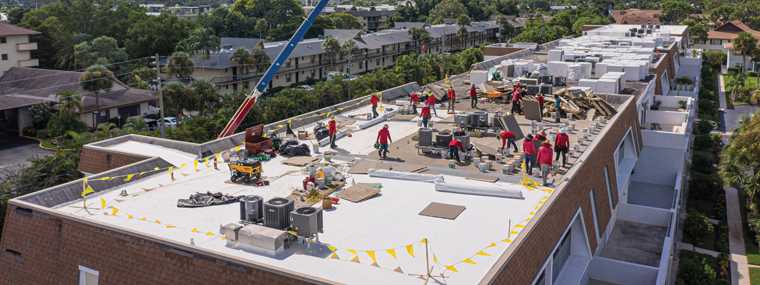
Maintenance Plans Help Validate Warranties on Your Roof
By Casey Crowther / Published February 2020

Manufacturer warranties are designed to give consumers peace of mind as an added protection in the unlikely event that a product fails early in its life cycle. But who actually reads the fine print? You, the consumer, should read it cover to cover.
For example, auto manufacturers often tout a five-year, 60,000-mile “bumper-to-bumper” warranty as protection for the buyer. However, if your engine blows out and you cannot produce evidence that you’ve had the oil changed or refilled the coolant, your expensive repair might not be covered.
Warranties are written by the manufacturer and often are filled with “outs”—reasons why the company does not have to repair or replace a particular item. In doing so, manufacturers are placing the responsibility on you, the product owner, to follow the terms outlined in the warranty.
Nearly everything in and around a home or business has a warranty, like appliances, machinery, and electronics. Your roof also has a warranty. In fact, you may have multiple policies, one from the manufacturer that covers roofing materials and one from the company that installed the roof that covers workmanship.
It is critically important that you abide by all terms of your roof warranty and pay special attention to exclusions like the following:
- Weather: Damage caused by hurricanes or hail would fall under your homeowner’s policy rather than the roof warranty.
- Alterations: The installation of solar panels, skylights, and communication systems, or even foot traffic, can damage a roof structure.
- Timeliness: Property owners or managers often are required to immediately report leaks or deficiencies to warrantors within a prescribed period of time, which can be as short as a few days.
A manufacturer’s warranty will not cover repairs caused by shoddy workmanship, and a roofing installer’s warranty will not cover repairs caused by defective roofing materials.
Commercial roofs can cost tens of thousands, even hundreds of thousands, of dollars to replace, so it’s critically important to ensure all warranty terms are followed. Preventive maintenance is a frequent requirement of manufacturer warranties. Much like rotating the tires and changing the air filter on a vehicle, preventive maintenance ensures a roof will continue working as it should.
Experienced commercial roofing contractors offer preventive maintenance plans that include comprehensive inspections and written reports that contain photo documentation, proposals for recommended work, and estimates of a roof’s remaining lifespan to help with future budgeting. Inspectors also can review warranty documents to ensure compliance.
Much like an annual visit to the doctor, roof inspectors are trained to spot irregularities. They’ll check structural integrity for evidence of water intrusion, particularly around flashings as well as gutters and downspouts, to ensure water is being channeled away from the roof and structure. For metal roofs, they’ll check for rust and water damage. For tile or shingle roofs, they’ll see if materials are still adhering to the surface or show cracks and chips. They’ll look for mold and mildew growth that can discolor or damage roofing materials.
These three factors are paramount when considering a maintenance plan with a roofing contractor:
- Certification—Many roofing companies offer inspections and maintenance plans, but it’s important to choose a roofing company that has Haag Certified Inspectors (HCI). It’s an industry-leading credential that signifies advanced skill levels and abilities in damage and repair assessment. They are experts in diagnosing damage caused by weather vs. manufacturing defects and natural deterioration of materials.
- Experience—Flat, metal, tile, and shingle roofs are substantially different, both in physical characteristics and installation methods, and inspectors should have an extensive history examining your specific type of roof.
- Local—Some companies advertise their services in regions where they don’t have a physical presence and will hire a subcontractor to actually conduct the inspection. Make sure the inspector is a full-time employee of that company.
Signing a maintenance plan is the best way to protect a roof, both now and in the future, while ensuring that your warranty remains valid.
Casey Crowther
President, Target Roofing & Sheet Metal
Casey Crowther is a fifth-generation roofer and president of Target Roofing & Sheet Metal, a licensed and insured commercial roofing specialist headquartered in Fort Myers. For more information, please visit TargetRoofers.com or call (239) 334-7496.




